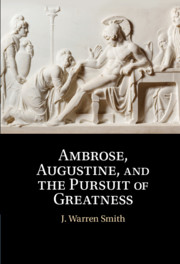Book contents
- Ambrose, Augustine, and the Pursuit of Greatness
- Ambrose, Augustine, and the Pursuit of Greatness
- Copyright page
- Dedication
- Contents
- Acknowledgments
- Abbreviations
- Introduction
- Part I The Problem of Greatness and the Great-Souled Man from Plato to Plutarch
- Part II Ambrose’s Great-Souled Christians
- 3 Ambrose
- 4 Toward a Higher Standard of Greatness
- 5 Humiliation without Shame or Resentment
- Part III Augustine and the Magnus Animus
- Epilogue
- Bibliography
- Index
4 - Toward a Higher Standard of Greatness
Renarrating Perfection
from Part II - Ambrose’s Great-Souled Christians
Published online by Cambridge University Press: 24 November 2020
- Ambrose, Augustine, and the Pursuit of Greatness
- Ambrose, Augustine, and the Pursuit of Greatness
- Copyright page
- Dedication
- Contents
- Acknowledgments
- Abbreviations
- Introduction
- Part I The Problem of Greatness and the Great-Souled Man from Plato to Plutarch
- Part II Ambrose’s Great-Souled Christians
- 3 Ambrose
- 4 Toward a Higher Standard of Greatness
- 5 Humiliation without Shame or Resentment
- Part III Augustine and the Magnus Animus
- Epilogue
- Bibliography
- Index
Summary
The ideal of magnitudo animi was a feature of Hellenistic moral discourse that shaped the cultural sensibilities of the Roman elite. By the end of the third and beginning of the fourth centuries, some of these Romans, like the Emperor Diocletian, saw the expansion of Christianity as a threat to those cultural sensibilities and the cohesion of the empire. Although Diocletian’s systematic persecution of the church failed to purge the empire of Christianity, his judgment that Christianity was a cultural and political threat was prescient. With Constantine’s conferral of freedom of religious conscience in the Edict of Milan (313), Christianity stood upon an easier social foundation than it had the previous two-and-a-half centuries.1 Yet among the fourth-century bishops who had been educated in the Classical and Hellenistic paideia there remained a keen awareness of the ongoing cultural conflict between Christianity and paganism. More than official recognition, protection, and patronage granted by Constantius II and Theodosius I, the church needed to establish its own cultural credentials if it was going to convert the hearts and minds of the literati. Christianity could challenge the vital vestiges of pagan culture by fashioning an alternative culture with its own literary canon beyond Scripture. To do this Christianity needed to appeal to both the upper classes’ cultural tastes and their sense of excellence and nobility. Therefore, Christianity required authors who could create works of literature (e.g. Gregory of Nazianzus’ poetry) to match or even surpass the artistry of pagan masters.2 It also needed authors who could blend appreciation and critique of the ancient traditions of virtue in a way that found common ground with the teachings of non-Christian moralists and at the same time presented the Christian life as a higher form of virtue. Since the great-souled man described in Cicero, Seneca, and Plutarch was associated with the nobility admired by Roman elites or would-be elites, Christian moralists had to renarrate the ideal of magnanimity within the larger Christian narrative of Scripture.
- Type
- Chapter
- Information
- Ambrose, Augustine, and the Pursuit of Greatness , pp. 132 - 167Publisher: Cambridge University PressPrint publication year: 2020



